Fall 2024
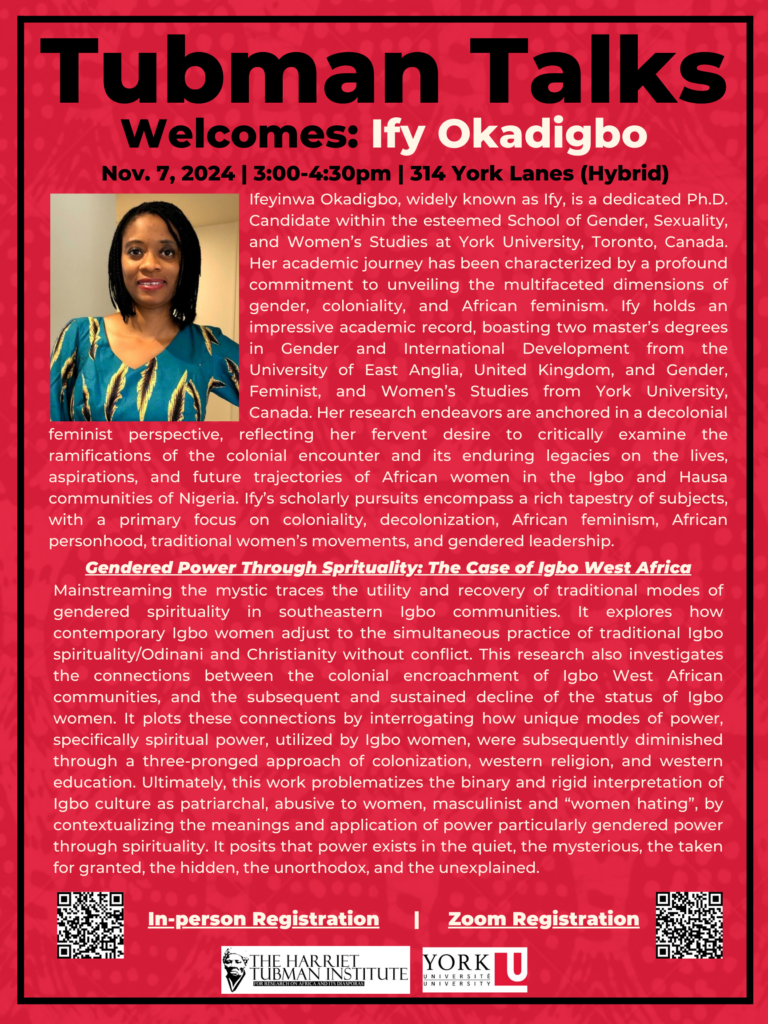
Date: Thursday, November 7, 2024
Time: 3:00-4:30pm Eastern Time
Location: Tubman Resource Room (314 York Lanes), York University, Keele Campus
Title: Gendered Power Through Sprituality: The Case of Igbo West Africa
Abstract: Mainstreaming the mystic traces the utility and recovery of traditional modes of gendered spirituality in southeastern Igbo communities. It explores how contemporary Igbo women adjust to the simultaneous practice of traditional Igbo spirituality/Odinani and Christianity without conflict. This research also investigates the connections between the colonial encroachment of Igbo West African communities, and the subsequent and sustained decline of the status of Igbo women. It plots these connections by interrogating how unique modes of power, specifically spiritual power, utilized by Igbo women, were subsequently diminished through a three-pronged approach of colonization, western religion, and western education. Ultimately, this work problematizes the binary and rigid interpretation of Igbo culture as patriarchal, abusive to women, masculinist and “women hating”, by contextualizing the meanings and application of power particularly gendered power through spirituality. It posits that power exists in the quiet, the mysterious, the taken for granted, the hidden, the unorthodox, and the unexplained.
Bio: Ifeyinwa Okadigbo, widely known as Ify, is a dedicated Ph.D. Candidate within the esteemed School of Gender, Sexuality, and Women’s Studies at York University, Toronto, Canada. Her academic journey has been characterized by a profound commitment to unveiling the multifaceted dimensions of gender, coloniality, and African feminism. Ify holds an impressive academic record, boasting two master’s degrees in Gender and International Development from the University of East Anglia, United Kingdom, and Gender, Feminist, and Women’s Studies from York University, Canada.
Her research endeavors are anchored in a decolonial feminist perspective, reflecting her fervent desire to critically examine the ramifications of the colonial encounter and its enduring legacies on the lives, aspirations, and future trajectories of African women in the Igbo and Hausa communities of Nigeria. Ify’s scholarly pursuits encompass a rich tapestry of subjects, with a primary focus on coloniality, decolonization, African feminism, African personhood, traditional women’s movements, and gendered leadership.
In her recent work, Ify has expanded her research horizon to encompass the intricate discourses surrounding gendered power and its unique connections to Igbo spirituality. Her exploration delves into how African women continually disrupt the prevailing binary narratives that often oversimplify the interplay between Western religious influences and African spirituality.
Her multidisciplinary approach to complex issues in the realm of gendered power and its connections to spirituality promises to contribute significantly to the evolving discourse in these fields, ultimately paving the way for a more inclusive and equitable future.
Her work has been supported by many Grants and Fellowships.
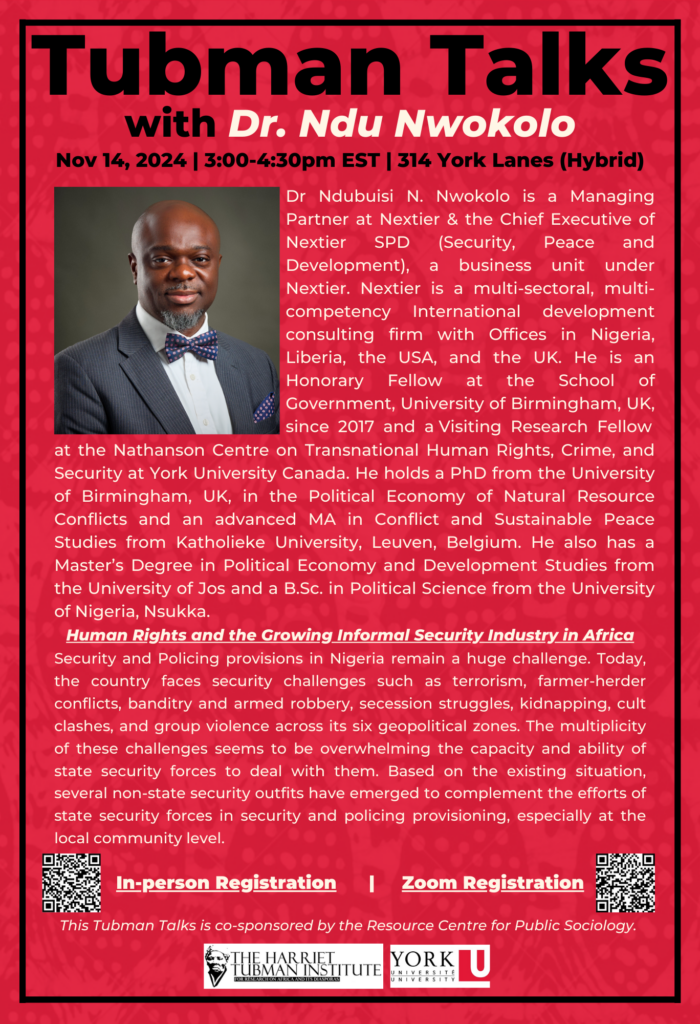
Date: Thursday, November 14, 2024
Time: 3:00-4:30pm Eastern Time
Location: Tubman Resource Room (314 York Lanes), York University, Keele Campus
This Tubman Talks is co-sponsored by the Resource Centre for Public Sociology.
Title: Non-State Security Provision and Human Rights Abuses in Nigeria: Rethinking the influence of the Principals on the agents
Bio: Dr Ndubuisi N. Nwokolo is a Managing Partner at Nextier & the Chief Executive of Nextier SPD (Security, Peace and Development), a business unit under Nextier. Nextier is a multi-sectoral, multi-competency International development consulting firm with Offices in Nigeria, Liberia, the USA, and the UK.
He is an Honorary Fellow at the School of Government, University of Birmingham, UK, since 2017 and a Visiting Research Fellow at the Nathanson Centre on Transnational Human Rights, Crime, and Security at York University Canada. He holds a PhD from the University of Birmingham, UK, in the Political Economy of Natural Resource Conflicts and an advanced MA in Conflict and Sustainable Peace Studies from Katholieke University, Leuven, Belgium. He also has a Master’s Degree in Political Economy and Development Studies from the University of Jos and a B.Sc. in Political Science from the University of Nigeria, Nsukka.
Ndu is recognised as a Peacebuilding, Conflict, Security, governance, and International Development Specialist with significant experience and knowledge of Nigeria’s and Africa’s conflict, stabilisation, security, democratic and governance interventions. He consults for International organisations and Development agencies and has been published in academic journals, newspapers, and policy briefs.
Abstract: Security and Policing provisions in Nigeria remain a huge challenge. Today, the country faces security challenges such as terrorism, farmer-herder conflicts, banditry and armed robbery, secession struggles, kidnapping, cult clashes, and group violence across its six geopolitical zones. The multiplicity of these challenges seems to be overwhelming the capacity and ability of state security forces to deal with them. Based on the existing situation, several non-state security outfits have emerged to complement the efforts of state security forces in security and policing provisioning, especially at the local community level.
In many societies, non-state security and policing platforms often emerge when people perceive political authorities and law enforcement institutions as biased, illegitimate or ineffective. In some situations, such a notion leads to the emergence of self-help security actors who apply their kind of justice (Asif & Weenink, 2019). In Nigeria, they consist of vigilante groups, neighbourhood watch, hunter-guard groups, night watch groups, etc. Based on the need for self-help, they function within platforms that perform security and policing-related responsibilities even when such tasks were not designated to them by the country’s constitution. However, some states in Nigeria (federating units) that have established such security outfits on the grounds of augmenting the conventional national security provisions have such outfits backed by state assembly laws but not the constitution.
Narratives of non-state security outfits using on-the-spot corporal punishment such as beating, flogging, and even lynching of suspects are becoming frightening. As these non-state security actors grow in size and numbers due to security challenges, their human rights abuses increase, especially with the absence of national regulations. However, shared understanding and knowledge is that the collaborations between the state security actors/outfits as principals and the non-state security actors/outfits as agents means that the state security outfits oversight and regulate the non-state security outfits even though the constitution has not made such provisions. Based on the Principal-agent theory, it agitates the minds to wonder if a principal with an institutional problem of human rights violations could force its agent to desist from human rights abuse. Drawing on this theory, the current security situation and human rights abuses by state security outfits in the country, making non-state security outfits conform to human rights standards, needs more than constitutional provisions and regulatory processes.
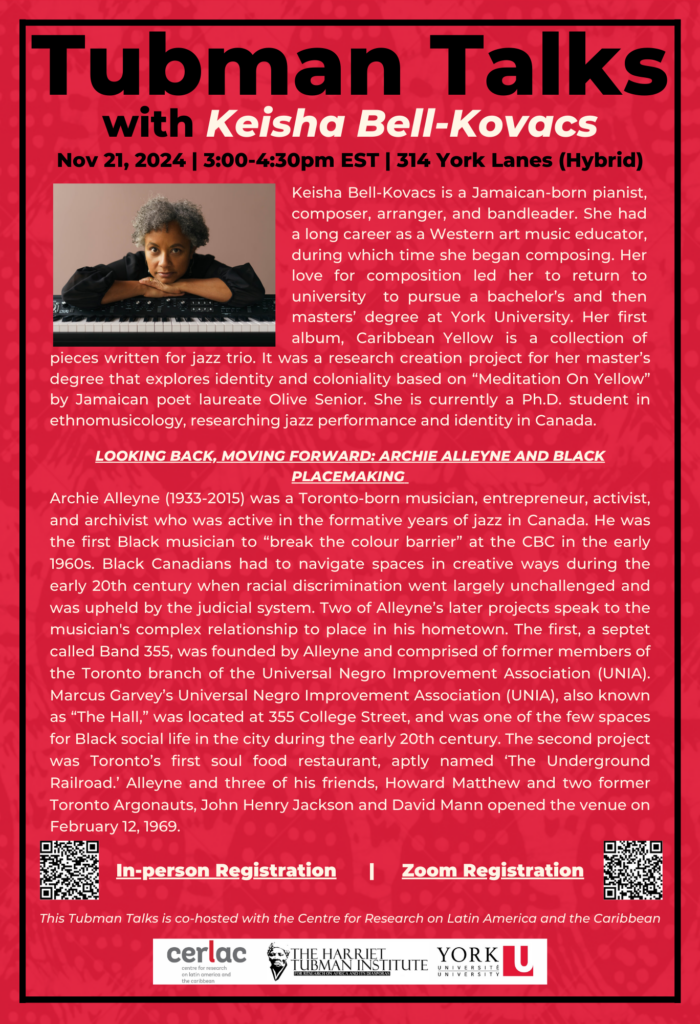
Tubman Talks with Keisha Bell-Kovacs: Looking Back, Moving Forward: Archie Alleyne and Black Placemaking - Nov 21
This Tubman Talks is co-hosted with the Centre for Research on Latin America and the Caribbean (CERLAC).
Date: Thursday, November 21, 2024
Time: 3:00-4:30pm Eastern Time
Location: Tubman Resource Room (314 York Lanes), York University, Keele Campus
Title: Looking Back, Moving Forward: Archie Alleyne and Black Placemaking
Abstract: Archie Alleyne (1933-2015) was a Toronto-born musician, entrepreneur, activist, and archivist who was active in the formative years of jazz in Canada. He was the first Black musician to “break the colour barrier” at the CBC in the early 1960s. Black Canadians had to navigate spaces in creative ways during the early 20th century when racial discrimination went largely unchallenged and was upheld by the judicial system. Two of Alleyne’s later projects speak to the musician's complex relationship to place in his hometown. The first, a septet called Band 355, was founded by Alleyne and comprised of former members of the Toronto branch of the Universal Negro Improvement Association (UNIA). Marcus Garvey’s Universal Negro Improvement Association (UNIA), also known as “The Hall,” was located at 355 College Street, and was one of the few spaces for Black social life in the city during the early 20th century. The second project was Toronto’s first soul food restaurant, aptly named ‘The Underground Railroad.’ Alleyne and three of his friends, Howard Matthew and two former Toronto Argonauts, John Henry Jackson and David Mann opened the venue on February 12, 1969.
Black geographies are located in fugitivity, a separate realm that refuses the choices of the established hierarchies. A black sense of place is multidimensional, produced not only by the social and material but also the temporal. Weaving together the Ghanaian-Akan concept of sankofa - ‘looking back while moving forward’ with ideas of fugitivity within black geographies, this research considers the relational nature of black placemaking. This work suggests that the Underground Railroad and Band 355 exemplify how Alleyne creatively remapped and reasserted Black presence in the city.
Bio: Keisha is a musician whose creative practice seeks to incorporate elements of Jamaican folk music with heritage Black American forms. She also enjoys performing repertoire that has roots in the wider Caribbean and South America. Her research interests include themes of identity, social justice, geographies, and Canadian jazz scholarship.
Winter 2025
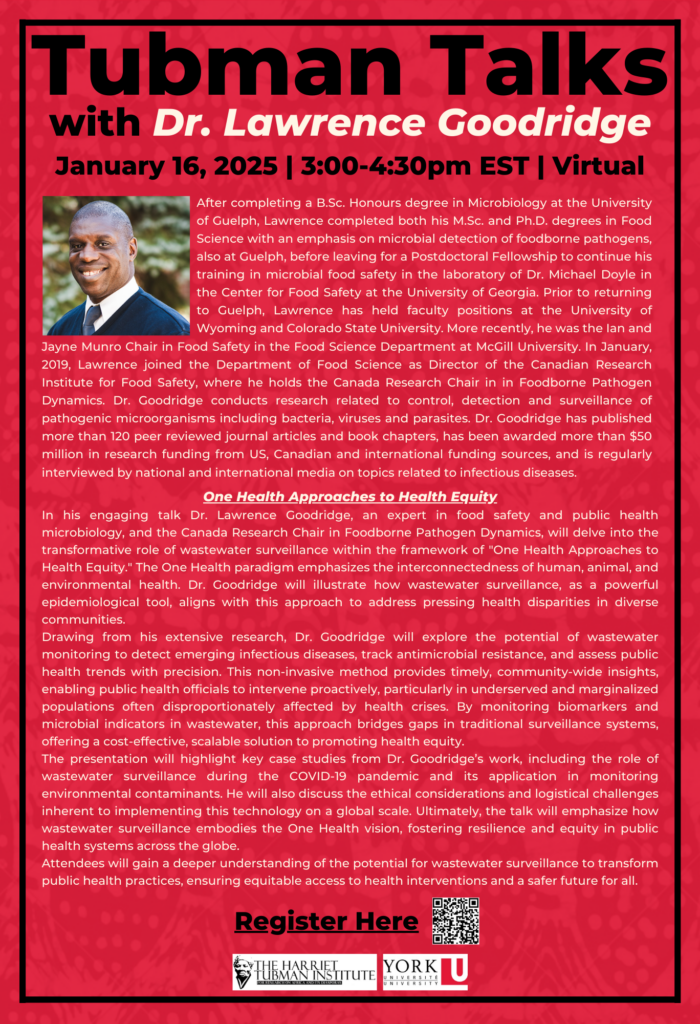
Tubman Talks with Dr. Lawrence Goodridge
Date: Thursday, January 16, 2025
Time: 3:00-4:30pm Eastern Standard Time
Location: Zoom
Bio: Canadian Research Institute for Food Safety, where he holds the Canada Research Chair in in Foodborne Pathogen Dynamics. Dr. Goodridge conducts research related to control, detection and surveillance of pathogenic microorganisms including bacteria, viruses and parasites. Dr. Goodridge has published more than 120 peer reviewed journal articles and book chapters, has been awarded more than $50 million in research funding from US, Canadian and international funding sources, and is regularly interviewed by national and international media on topics related to infectious diseases.
After completing a B.Sc. Honours degree in Microbiology at the University of Guelph, Lawrence completed both his M.Sc. and Ph.D. degrees in Food Science with an emphasis on microbial detection of foodborne pathogens, also at Guelph, before leaving for a Postdoctoral Fellowship to continue his training in microbial food safety in the laboratory of Dr. Michael Doyle in the Center for Food Safety at the University of Georgia. Prior to returning to Guelph, Lawrence has held faculty positions at the University of Wyoming and Colorado State University. More recently, he was the Ian and Jayne Munro Chair in Food Safety in the Food Science Department at McGill University. In January, 2019, Lawrence joined the Department of Food Science as Director of the
Abstract:
In his engaging talk at the Harriet Tubman Institute, Dr. Lawrence Goodridge, an expert in food safety and public health microbiology, and the Canada Research Chair in Foodborne Pathogen Dynamics, will delve into the transformative role of wastewater surveillance within the framework of "One Health Approaches to Health Equity." The One Health paradigm emphasizes the interconnectedness of human, animal, and environmental health. Dr. Goodridge will illustrate how wastewater surveillance, as a powerful epidemiological tool, aligns with this approach to address pressing health disparities in diverse communities.
Drawing from his extensive research, Dr. Goodridge will explore the potential of wastewater monitoring to detect emerging infectious diseases, track antimicrobial resistance, and assess public health trends with precision. This non-invasive method provides timely, community-wide insights, enabling public health officials to intervene proactively, particularly in underserved and marginalized populations often disproportionately affected by health crises. By monitoring biomarkers and microbial indicators in wastewater, this approach bridges gaps in traditional surveillance systems, offering a cost-effective, scalable solution to promoting health equity.
The presentation will highlight key case studies from Dr. Goodridge’s work, including the role of wastewater surveillance during the COVID-19 pandemic and its application in monitoring environmental contaminants. He will also discuss the ethical considerations and logistical challenges inherent to implementing this technology on a global scale. Ultimately, the talk will emphasize how wastewater surveillance embodies the One Health vision, fostering resilience and equity in public health systems across the globe.
Attendees will gain a deeper understanding of the potential for wastewater surveillance to transform public health practices, ensuring equitable access to health interventions and a safer future for all.
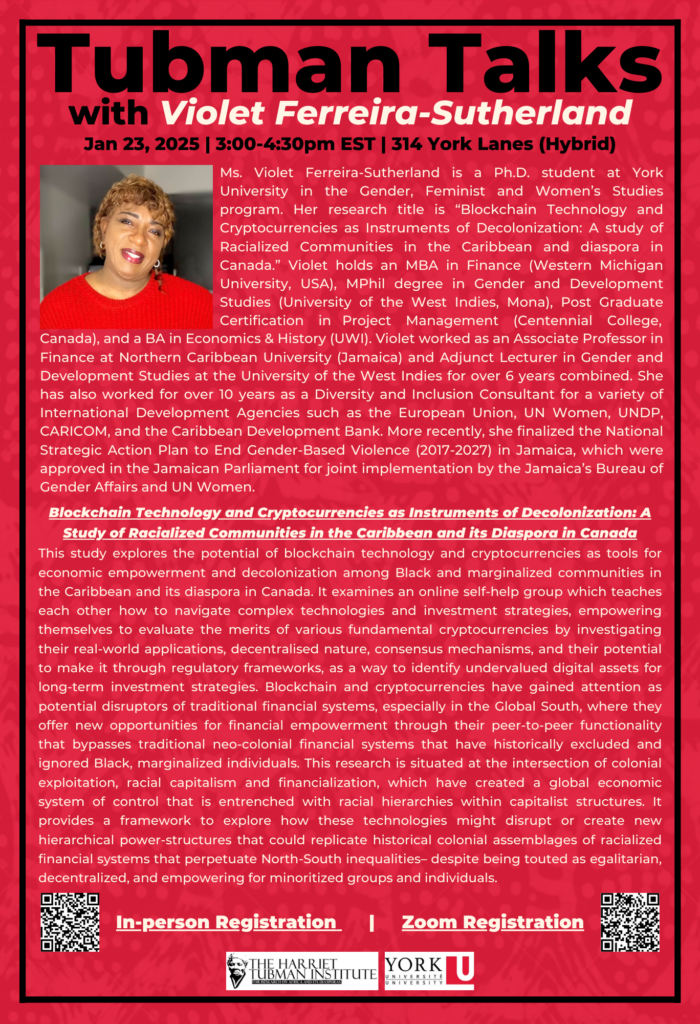
Tubman Talks with Violet Ferreira-Sutherland: Blockchain Technology and Cryptocurrencies as Instruments of Decolonization: A Study of Racialized Communities in the Caribbean and its Diaspora in Canada.
Date: Thursday, January 23, 2025
Time: 3:00-4:30pm Eastern Time
Location: Zoom
Bio: Ms. Violet Ferreira-Sutherland is a Ph.D. student at York University in the Gender, Feminist and Women’s Studies program. Her research title is “Blockchain Technology and Cryptocurrencies as Instruments of Decolonization: A study of Racialized Communities in the Caribbean and diaspora in Canada.” Violet holds an MBA in Finance (Western Michigan University, USA), MPhil degree in Gender and Development Studies (University of the West Indies, Mona), Post Graduate Certification in Project Management (Centennial College, Canada), and a BA in Economics & History (UWI).
Violet worked as an Associate Professor in Finance at Northern Caribbean University (Jamaica) and Adjunct Lecturer in Gender and Development Studies at the University of the West Indies for over 6 years combined. She has also worked for over 10 years as a Diversity and Inclusion Consultant for a variety of International Development Agencies such as the European Union, UN Women, UNDP, CARICOM, and the Caribbean Development Bank. More recently, she finalized the National Strategic Action Plan to End Gender-Based Violence (2017-2027) in Jamaica, which were approved in the Jamaican Parliament for joint implementation by the Jamaica’s Bureau of Gender Affairs and UN Women.
Abstract: This study explores the potential of blockchain technology and cryptocurrencies as tools for economic empowerment and decolonization among Black and marginalized communities in the Caribbean and its diaspora in Canada. It examines an online self-help group which teaches each other how to navigate complex technologies and investment strategies, empowering themselves to evaluate the merits of various fundamental cryptocurrencies by investigating their real-world applications, decentralised nature, consensus mechanisms, and their potential to make it through regulatory frameworks, as a way to identify undervalued digital assets for long-term investment strategies. Blockchain and cryptocurrencies have gained attention as potential disruptors of traditional financial systems, especially in the Global South, where they offer new opportunities for financial empowerment through their peer-to-peer functionality that bypasses traditional neo-colonial financial systems that have historically excluded and ignored Black, marginalized individuals. This research is situated at the intersection of colonial exploitation, racial capitalism and financialization, which have created a global economic system of control that is entrenched with racial hierarchies within capitalist structures. It provides a framework to explore how these technologies might disrupt or create new hierarchical power-structures that could replicate historical colonial assemblages of racialized financial systems that perpetuate North-South inequalities– despite being touted as egalitarian, decentralized, and empowering for minoritized groups and individuals. The study applies Cedric Robinson's concept of racial capitalism and insights from Frantz Fanon and Donna Haraway to analyze the transformative potential of blockchain but also their potential for being co-opted as neo-colonial weapons of domination. This research serves as a critical representation of Black knowledge from the Global South, contributing significantly to scholarly debates on local knowledge production, here, in the context of blockchain and cryptocurrencies adoption. By focusing on how these technologies are understood and utilized within Caribbean and diaspora communities, the study critiques the dominant narratives produced by the global North. These hegemonic discourses often construct "expert" knowledge about the global South without engaging with the lived experiences and intellectual contributions of those within the Caribbean. This research, therefore, not only enriches academic discussions and scholarly conversations but also challenges the power structures that shape global knowledge production.
Key Words: Blockchain technology, Cryptocurrencies, Economic empowerment, Decolonization, Black communities, Caribbean and diaspora, Online self-help group.
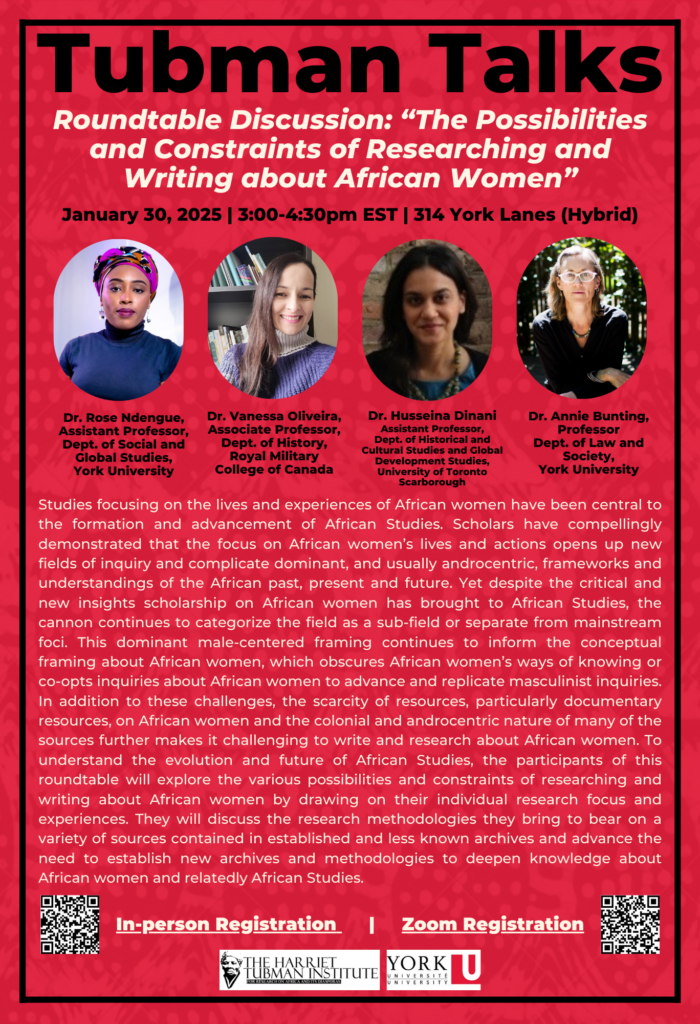
Tubman Talks Roundtable: The Possibilities and Constraints of Researching and Writing about African Women
Panelists: Dr. Rose Ndengue, Dr. Vanessa Oliveira, Dr. Husseina Dinani, and Dr. Annie Bunting
Date: Thursday, January 30, 2025
Time: 3:00-4:30pm Eastern Time
Location: Tubman Resource Room (314 York Lanes), York University, Keele Campus
Abstract:
Studies focusing on the lives and experiences of African women have been central to the formation and advancement of African Studies. Scholars have compellingly demonstrated that the focus on African women’s lives and actions opens up new fields of inquiry and complicate dominant, and usually androcentric, frameworks and understandings of the African past, present and future. Yet despite the critical and new insights scholarship on African women has brought to African Studies, the cannon continues to categorize the field as a sub-field or separate from mainstream foci. This dominant male-centered framing continues to inform the conceptual framing about African women, which obscures African women’s ways of knowing or co-opts inquiries about African women to advance and replicate masculinist inquiries. In addition to these challenges, the scarcity of resources, particularly documentary resources, on African women and the colonial and androcentric nature of many of the sources further makes it challenging to write and research about African women. To understand the evolution and future of African Studies, the participants of this roundtable will explore the various possibilities and constraints of researching and writing about African women by drawing on their individual research focus and experiences. They will discuss the research methodologies they bring to bear on a variety of sources contained in established and less known archives and advance the need to establish new archives and methodologies to deepen knowledge about African women and relatedly African Studies.
Bios:
Rose Ndengue is a Socio-historian and political scientist, Cameroonian scholar-activist, who defines herself as a black feminist from the transatlantic space, straddling Africa, Europe and the Americas. She is currently Assistant Professor in the Department of Social and Global studies at Glendon, York University, where she is developing a teaching program in African Studies and Black feminisms, from postcolonial and decolonial frameworks. Her research focuses on gender and politics in Africa and in the diasporas, in colonial and post-colonial contexts, with a particular emphasis on African and Afrodescendant women's mobilizations in Cameroonian and French contexts. She is currently working on book project in French entitled : (In)civilités Subalternes : Les mobilisations des Camerounaises et la pensée féministe noire.
Vanessa S. Oliveira is an Associate Professor of African history in the Department of History at the Royal Military College of Canada, Kingston. She teaches courses on European colonialism, women and gender, research methodology, and early and modern Africa. Her research interests include slavery, slave trading, the transition to legitimate commerce in tropical commodities, and women merchants. She has published numerous journal articles and book chapters in both Portuguese and English. Her book Slave Trade and Abolition: Gender, Commerce and Economic Transition in Luanda was published in 2021 by the University of Wisconsin Press.
Husseina Dinani is an Assistant Professor in the Departments of Historical and Cultural Studies and Global Development Studies at University of Toronto Scarborough. At UTSC, Husseina teaches undergraduate courses in History, Women's and Gender Studies, African Studies and International Development Studies. Husseina is currently preparing a book manuscript, tentatively entitled, "Women of the Colony: Gender and Resourcefulness in southeastern Tanzania." The manuscript examines the decolonization period in southeastern Tanzania from the perspectives of gender and rural women. She has published aspects of this research in the International Journal of African Historical Studies and Gender & History. Husseina's research interests also focus on labour and the colonial state in Tanzania and East African South Asians in Tanzania and Canada.
Annie Bunting is a Professor of Law & Society and York Research Chair in International Gender Justice & Peacebuilding. Her research includes socio-legal studies of marriage and childhoods, feminist international law, and culture, religion and law. From 2010-2022, she directed an international research collaboration (SSHRC-funded Partnership 2015-2022) called Conjugal Slavery in War: Partnership for the study of enslavement, marriage and masculinities with historians of slavery, community-based researchers and women’s human rights scholars. She is the co-editor of Marriage by Force? Contestation over Consent and Coercion in Africa (Ohio Univ. Press, 2016) with Benjamin Lawrance and Richard Roberts; Contemporary Slavery: Popular Rhetoric and Political Practice (Univ. of British Columbia Press, 2017; Cornell Univ. Press, 2018) with Joel Quirk; and Research as more than extraction: Knowledge production and sexual violence in post conflict African societies (Ohio Univ. Press, 2023) with Allen Kiconco and Joel Quirk.
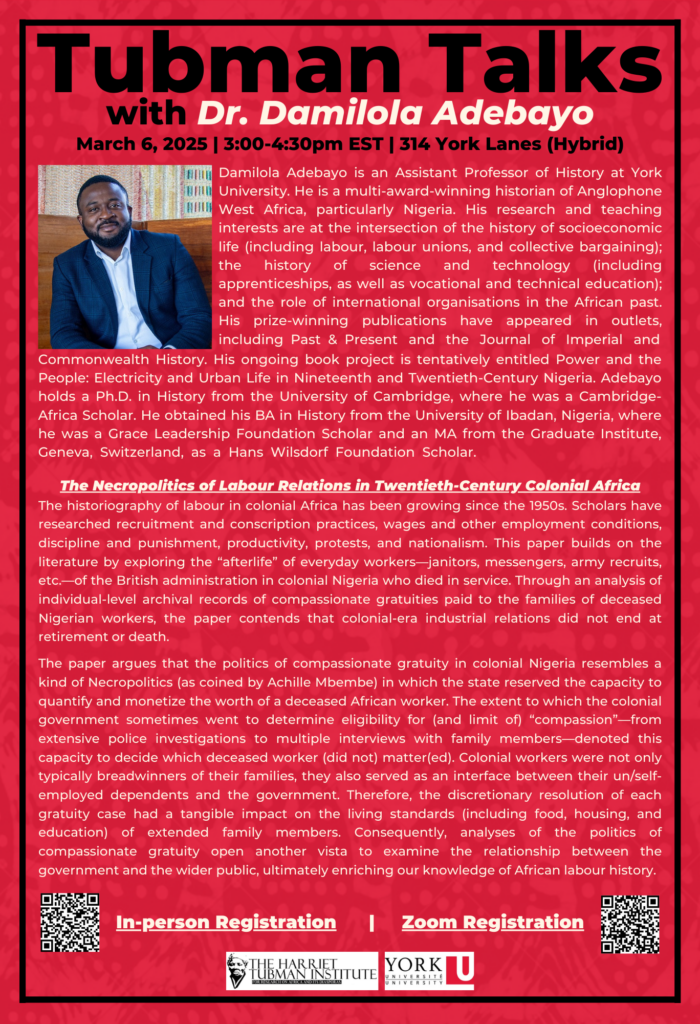
Tubman Talks with Dr. Damilola Adebayo: The Necropolitics of Labour Relations in Twentieth-Century Colonial Africa
Date: Thursday, March 6, 2025
Time: 3:00-4:30pm EST
Location: 314 York Lanes (York University, 4700 Keele St, Toronto, M3J 1P3)
In-person Registration: https://research.apps01.yorku.ca/machform/view.php?id=257442
Zoom Registration: https://yorku.zoom.us/meeting/register/Ur8REypSQVKDGkILHbBH9w
Bio: Damilola Adebayo is an Assistant Professor of History at York University. He is a multi-award-winning historian of Anglophone West Africa, particularly Nigeria. His research and teaching interests are at the intersection of the history of socioeconomic life (including labour, labour unions, and collective bargaining); the history of science and technology (including apprenticeships, as well as vocational and technical education); and the role of international organisations in the African past. His prize-winning publications have appeared in outlets, including Past & Present and the Journal of Imperial and Commonwealth History. His ongoing book project is tentatively entitled Power and the People: Electricity and Urban Life in Nineteenth and Twentieth-Century Nigeria. Adebayo holds a Ph.D. in History from the University of Cambridge, where he was a Cambridge-Africa Scholar. He obtained his BA in History from the University of Ibadan, Nigeria, where he was a Grace Leadership Foundation Scholar and an MA from the Graduate Institute, Geneva, Switzerland, as a Hans Wilsdorf Foundation Scholar.
Title: The Necropolitics of Labour Relations in Twentieth-Century Colonial Africa
Abstract: The historiography of labour in colonial Africa has been growing since the 1950s. Scholars have researched recruitment and conscription practices, wages and other employment conditions, discipline and punishment, productivity, protests, and nationalism. This paper builds on the literature by exploring the “afterlife” of everyday workers—janitors, messengers, army recruits, etc.—of the British administration in colonial Nigeria who died in service. Through an analysis of individual-level archival records of compassionate gratuities paid to the families of deceased Nigerian workers, the paper contends that colonial-era industrial relations did not end at retirement or death.
The paper argues that the politics of compassionate gratuity in colonial Nigeria resembles a kind of Necropolitics (as coined by Achille Mbembe) in which the state reserved the capacity to quantify and monetize the worth of a deceased African worker. The extent to which the colonial government sometimes went to determine eligibility for (and limit of) “compassion”—from extensive police investigations to multiple interviews with family members—denoted this capacity to decide which deceased worker (did not) matter(ed). Colonial workers were not only typically breadwinners of their families, they also served as an interface between their un/self-employed dependents and the government. Therefore, the discretionary resolution of each gratuity case had a tangible impact on the living standards (including food, housing, and education) of extended family members. Consequently, analyses of the politics of compassionate gratuity open another vista to examine the relationship between the government and the wider public, ultimately enriching our knowledge of African labour history.
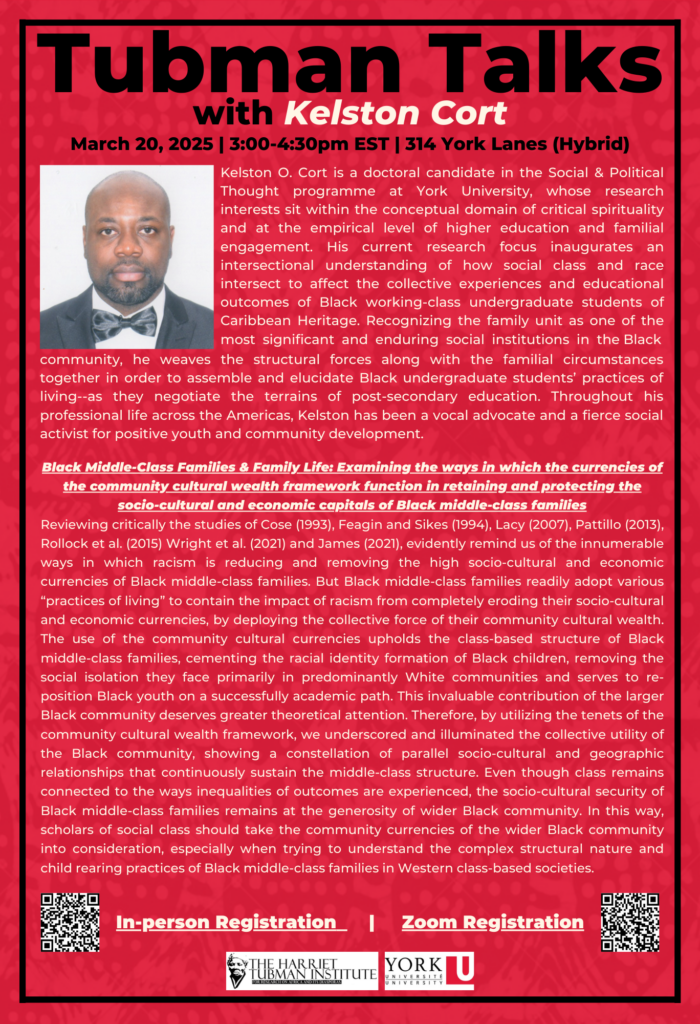
Tubman Talks with Kelston Cort: Black Middle-Class Families & Family Life: Examining the ways in which the currencies of the community cultural wealth framework function in retaining and protecting the socio-cultural and economic capitals of Black middle-class families.
Date: Thursday, March 20, 2025
Time: 3:00-4:30pm Eastern Time
Location: Tubman Resource Room (314 York Lanes), York University, Keele Campus
In-person Registration: https://research.apps01.yorku.ca/machform/view.php?id=249518
Zoom Registration: https://yorku.zoom.us/meeting/register/qYXa3j3HTnm8i1JqWrQATw
Biography: Kelston O. Cort is a doctoral candidate in the Social & Political Thought programme at York University, whose research interests sit within the conceptual domain of critical spirituality and at the empirical level of higher education and familial engagement. His current research focus inaugurates an intersectional understanding of how social class and race intersect to affect the collective experiences and educational outcomes of Black working-class undergraduate students of Caribbean Heritage. Recognizing the family unit as one of the most significant and enduring social institutions in the Black community, he weaves the structural forces along with the familial circumstances together in order to assemble and elucidate Black undergraduate students’ practices of living--as they negotiate the terrains of post-secondary education. Throughout his professional life across the Americas, Kelston has been a vocal advocate and a fierce social activist for positive youth and community development.
Abstract: Reviewing critically the studies of Cose (1993), Feagin and Sikes (1994), Lacy (2007), Pattillo (2013), Rollock et al. (2015) Wright et al. (2021) and James (2021), evidently remind us of the innumerable ways in which racism is reducing and removing the high socio-cultural and economic currencies of Black middle-class families. But Black middle-class families readily adopt various “practices of living” to contain the impact of racism from completely eroding their socio-cultural and economic currencies, by deploying the collective force of their community cultural wealth. The use of the community cultural currencies upholds the class-based structure of Black middle-class families, cementing the racial identity formation of Black children, removing the social isolation they face primarily in predominantly White communities and serves to re-position Black youth on a successfully academic path. This invaluable contribution of the larger Black community deserves greater theoretical attention. Therefore, by utilizing the tenets of the community cultural wealth framework, we underscored and illuminated the collective utility of the Black community, showing a constellation of parallel socio-cultural and geographic relationships that continuously sustain the middle-class structure. Even though class remains connected to the ways inequalities of outcomes are experienced, the socio-cultural security of Black middle-class families remains at the generosity of wider Black community. In this way, scholars of social class should take the community currencies of the wider Black community into consideration, especially when trying to understand the complex structural nature and child rearing practices of Black middle-class families in Western class-based societies.
Keywords: Black middle-class; community cultural wealth; racism
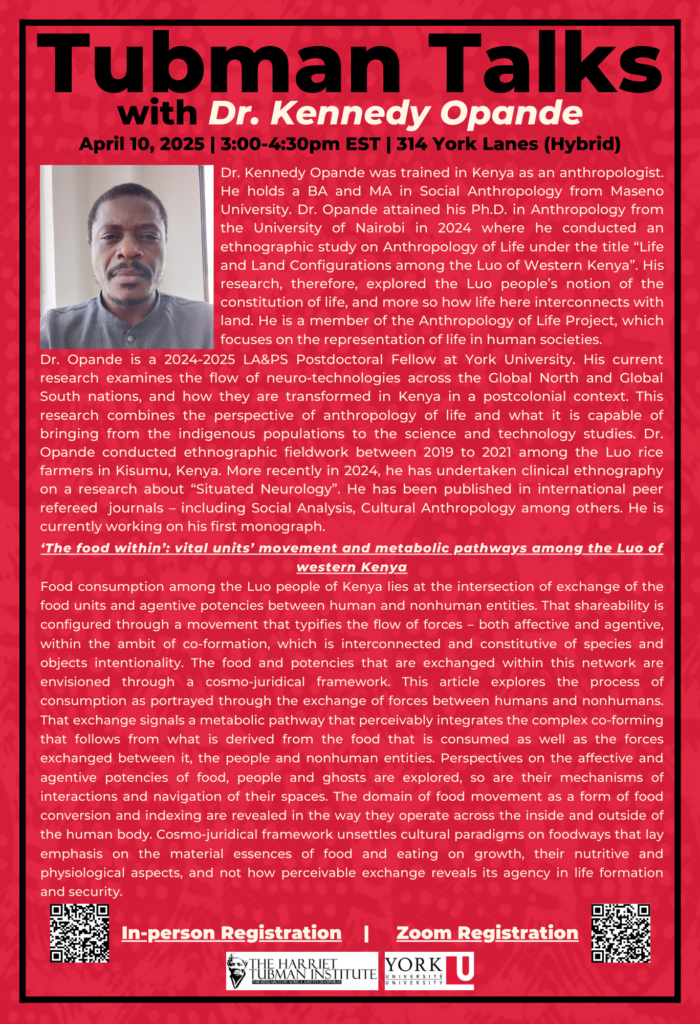
Tubman Talks with Kennedy Opande: ‘The food within’: vital units’ movement and metabolic pathways among the Luo of western Kenya
Date: Thursday, April 10, 2025
Time: 3:00-4:30pm Eastern Time
Location: Tubman Resource Room (314 York Lanes), York University, Keele Campus
In-person registration: https://research.apps01.yorku.ca/machform/view.php?id=261866
Zoom Registration: https://yorku.zoom.us/meeting/register/3eF4MLNlSe6rJ7ym_H3ePg
Title: ‘The food within’: vital units’ movement and metabolic pathways among the Luo of western Kenya
Abstract: Food consumption among the Luo people of Kenya lies at the intersection of exchange of the food units and agentive potencies between human and nonhuman entities. That shareability is configured through a movement that typifies the flow of forces – both affective and agentive, within the ambit of co-formation, which is interconnected and constitutive of species and objects intentionality. The food and potencies that are exchanged within this network are envisioned through a cosmo-juridical framework. This article explores the process of consumption as portrayed through the exchange of forces between humans and nonhumans. That exchange signals a metabolic pathway that perceivably integrates the complex co-forming that follows from what is derived from the food that is consumed as well as the forces exchanged between it, the people and nonhuman entities. Perspectives on the affective and agentive potencies of food, people and ghosts are explored, so are their mechanisms of interactions and navigation of their spaces. The domain of food movement as a form of food conversion and indexing are revealed in the way they operate across the inside and outside of the human body. Cosmo-juridical framework unsettles cultural paradigms on foodways that lay emphasis on the material essences of food and eating on growth, their nutritive and physiological aspects, and not how perceivable exchange reveals its agency in life formation and security.
Bio: Kennedy Opande, Ph.D. was trained in Kenya as an anthropologist. He holds BA and MA degrees in Social Anthropology from Maseno University. His MA explored cultural perspectives and responses of the Luo people to climate change. This project was instrumental in his future academic work as it introduced him to the concepts and notions of human agency and affect that not only outlined human life but also shaped its relationship with nonhuman entities such as objects, natural phenomena and resources among others. Dr. Opande attained his Ph.D. in Anthropology from the University of Nairobi in 2024. For his Ph.D., he conducted an ethnographic study on Anthropology of Life under the title “Life and Land Configurations among the Luo of Western Kenya”. His research, therefore, explored the Luo people’s notion of the constitution of life, and more so how life here interconnects with land. He is a member of the Anthropology of Life Project, which focuses on the representation of life in human societies. Dr. Opande is a 2024-2025 LA&PS Postdoctoral Fellow at York University. His current research examines the flow of neuro-technologies across the Global North and Global South nations, and how they are transformed in Kenya in a postcolonial context. This research combines the perspective of anthropology of life and what it is capable of bringing from the indigenous populations to the science and technology studies. Dr. Opande conducted ethnographic fieldwork between 2019 to 2021 among the Luo rice farmers in Kisumu, Kenya. More recently in 2024, he has undertaken clinical ethnography on a research about “Situated Neurology”. He has been published in international peer refereed journals – including Social Analysis, Cultural Anthropology among others. He is currently working on his first monograph.
